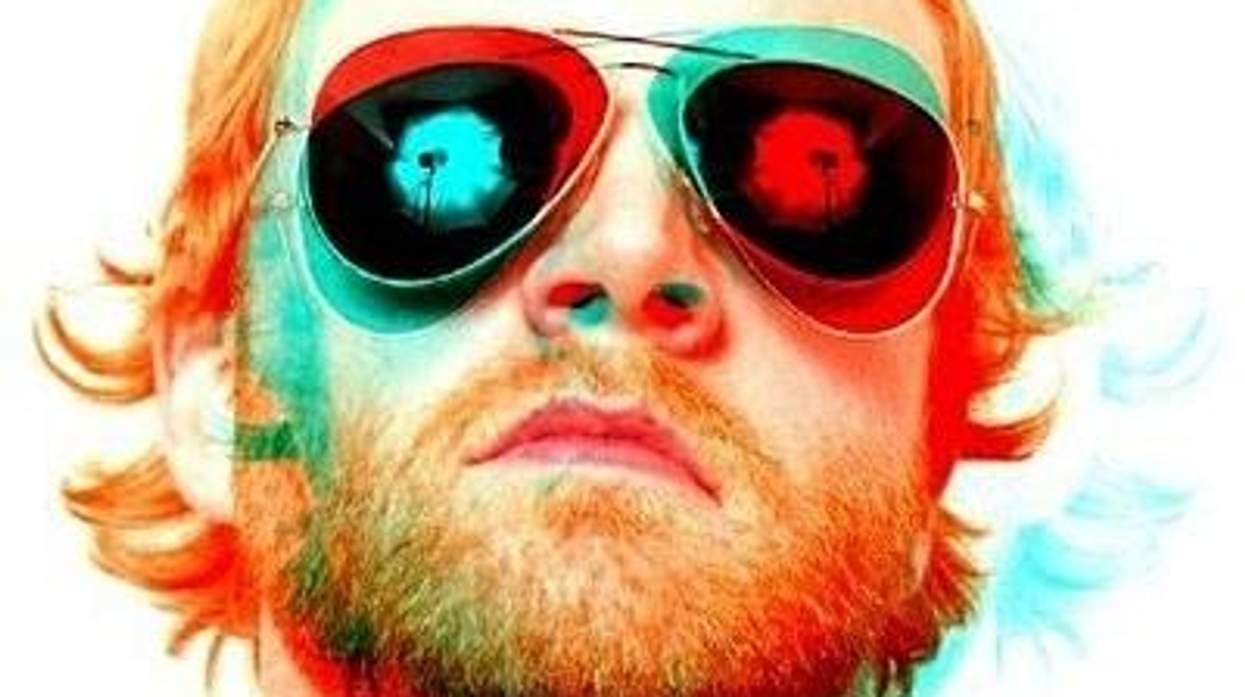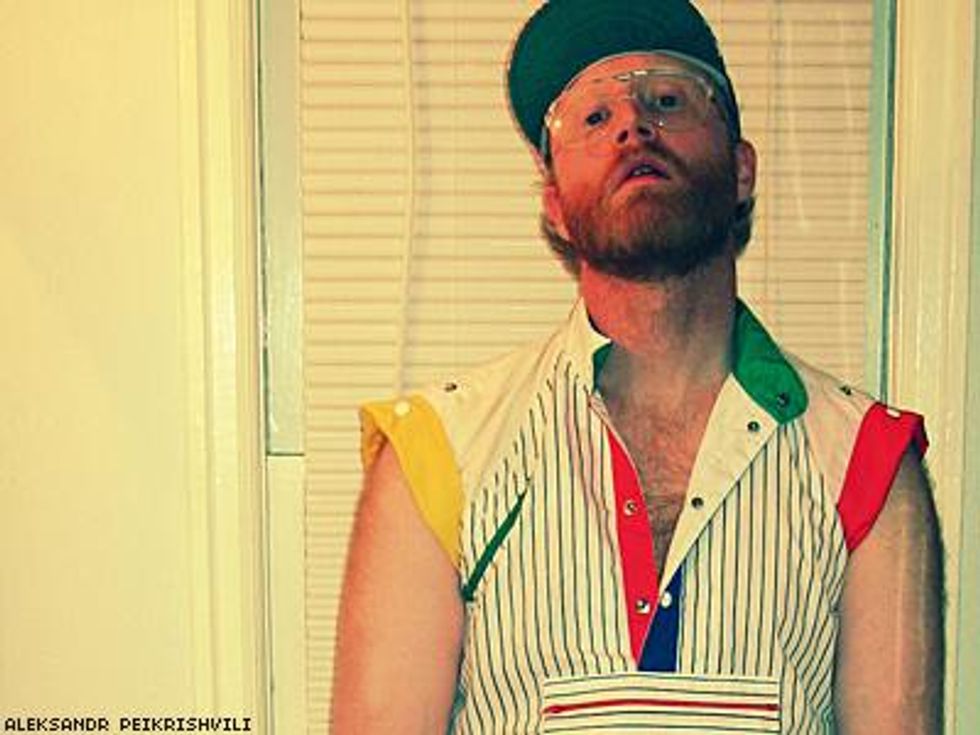Indie rocker Logan Lynn's life story is indeed a wild one. Somehow, a kid who grew up in a fundamentalist Christian church where even musical instruments were too secular to have around has developed into an innovative adult musician with a dirty-honest edge. "Turn Me Out," the debut track off his upcoming fifth studio album, Tramp Stamps and Birthmarks, is blunt, raunchy, and fun. And people are turning in; the track quickly became a top 30 hit on iTunes, and audiences are eagerly awaiting the next single, "Do You Want Me," scheduled to be released in September. Lynn chats with The Advocate about his eviction from fundamentalist church life, the drug use that almost killed him, and how music saved him.
The Advocate: What were you like as a kid?
Logan Lynn: I think I was pretty similar. I'm still pretty focused on love, family, and music. I've somehow managed to hold on to that in my adulthood.
What was your coming out experience like?
It was terrible. I'd been very depressed in high school. This religious upbringing had told me I was going to hell and was going to keep my eternal family from being together. I'd told one of my counselors about my early boyfriend I'd had and this particular counselor told my parents that I was gay and that I'd have to be removed from the church and sent to a boarding school in Tennessee the very next day. It was instant removal from my life. I fell full force into drug addiction for the next 15 years. I got clean in 2007 and have been clean ever since.
How did you survive?
At first it was just me. I went out on my own. I had to start over and rewire my brain that had been fully brainwashed and figure out who I was. I wanted a relationship with my family, but they were still involved with the church for another 10 years. I'm lucky that my family has now left the church and have in many ways come around to be even more liberal than me.
 Do you feel the need to rescue people from religious abuse?
Do you feel the need to rescue people from religious abuse?
I don't know if rescue is the right word. A lot of activism and outreach I do is around helping people who are in these kinds of churches and being harmed.
You spent a lot of time away from your blood relatives after you were evicted from the church. What does family mean to you now?
I think that definition has changed and is still in flux. Family is people that get me. A closed unit of people who understand and know what I'm about. I have both biological and chosen family.
What made you decide to get clean?
I had a partial stroke in 2007. I basically overdosed and felt like I was gonna die. I'd periodically tried and had little success. When that happened, I'd lost everything. I'd been nominated for an award and wasn't even able to attend the ceremony. I knew I'd reached the end of the line and I didn't want to die.
Is that when you turned to music?
Actually, when I was little, I was raised in a fundamentalist Christian cult. Our church wasn't even allowed to have instruments. But we did everything a cappella. I was trained to sing a cappella early on. Nothing secular. As I grew older this forbidden fruit of pop music was very desirable to me. I ran the risk of being in trouble for listening to it or having it taken away. It had a particular depth. Writing and making music felt like a homecoming of sorts. This thing that I'd never experienced in my childhood and was totally taboo. Even dancing was taboo.
Did you have mentors that guided you as you got into music?
No, I kinda had to do it all on my own. Once I got into public school in high school I fell in with some ravers early on and they took me to some warehouse parties.
 When did you decide to strike out as a solo musician?
When did you decide to strike out as a solo musician?
When I was a DJ and techno and electronic music obsessed. I had this singer-songwriter in me I'd always connected to musicians writing from a personal place: Tori Amos, Liz Phair, Elliot Smith. When I moved to Portland I met Elliot Smith and got to know him through parting, not the music. Somewhere along the way I mixed this singer-songwriter lyricist with this repetitive on-the-floor house music. One of Elliot's producers heard a demo I'd made and offered to take me to the studio and cut a record. I was only 17. This was pre-Postal Service. When the Postal Service's album came out I was little irritated by it. I'd been making that kind of music for a while but not just me, groups like Styrofoam had been doing that for a while too. But then I changed my mind. What was cool was that it opened a new door to an audience. It gave people a contextual reference.
What is it you're trying to achieve with your music?
I want to make music that I want to listen to. To have a way to clear my crazy head and get my voice about. About things I'm not brave enough to talk about. It started in the '90s as a way to communicate about things that were terrifying or out of my reach. It still serves that purpose I think. I kinda built a career on being sad and now I'm not so sad. I'm more hopeful. The record I'm making now is for my partner and I'm OK telling him how I feel, but a lot of time I need an external outlet.
Would you describe your first track as a little bit naughty?
The only time I'm any good is when I'm being honest. That song ended up being about sex and wanting to be loved. The desire around that relationship is to be desired, loved, and fucked. I think the song is characteristic of what's coming from the rest of the album. I think my pop music has always been based in the darker side of sexuality. This seems very celebratory.
Do you consider your work "post-closet" music?
I've always been out as a musician. I never was in. I've been very open about gay sex and queer love. I don't think I would have believed you if you'd told me years ago that what oppressed me was going to be a selling point. I think it's good that it's not a gimmick. It just is what it is. That it's universally about love. These things that everybody experiences, queer or otherwise.
Watch Lynn's video for "Turn Me Out" below.


 Do you feel the need to rescue people from religious abuse?
Do you feel the need to rescue people from religious abuse? When did you decide to strike out as a solo musician?
When did you decide to strike out as a solo musician?

































































Charlie Kirk DID say stoning gay people was the 'perfect law' — and these other heinous quotes